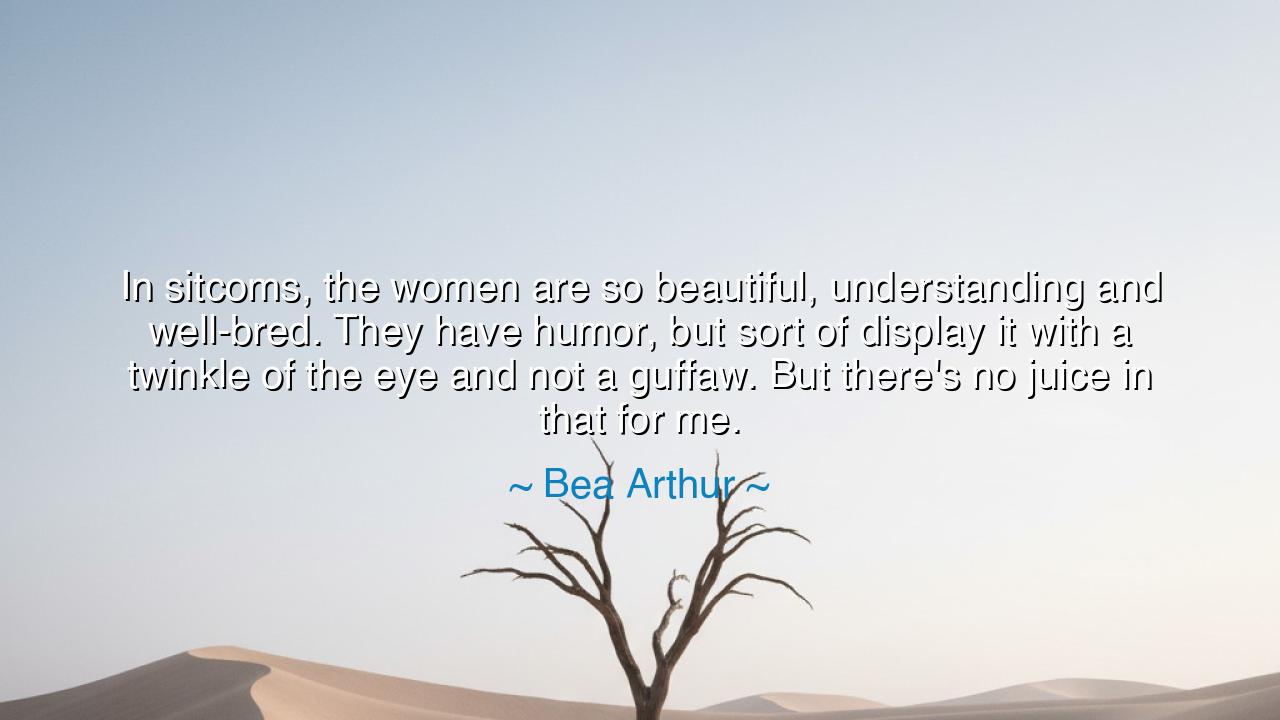
In sitcoms, the women are so beautiful, understanding and
In sitcoms, the women are so beautiful, understanding and well-bred. They have humor, but sort of display it with a twinkle of the eye and not a guffaw. But there's no juice in that for me.






Hear the words of Bea Arthur, the iron-willed matriarch of laughter and truth: “In sitcoms, the women are so beautiful, understanding and well-bred. They have humor, but sort of display it with a twinkle of the eye and not a guffaw. But there’s no juice in that for me.” These words, though simple in tone, ring with defiance and wisdom. They are a cry against convention—a declaration that real strength, real humor, and real womanhood cannot live behind the mask of polite perfection. In this, Arthur was not merely speaking of comedy, but of the eternal struggle for authenticity in a world that worships appearances.
She saw that the sitcom woman, often crafted by men and molded by culture, was expected to laugh softly, to sparkle rather than thunder, to amuse without unsettling. Her humor was meant to charm, not to challenge; to soothe, not to shock. But to Bea Arthur, there was no life in that. The juice she sought was the pulse of truth—the humor that comes from struggle, the laughter that rises from pain, the comedy that does not conceal reality but confronts it. She understood that the most powerful humor is not born of politeness, but of courage.
For Arthur, the stage was not a place for pretense, but for revelation. She embodied women who were fierce, flawed, and gloriously human—women who did not twinkle with irony, but roared with conviction. When she played Maude, she gave voice to a generation of women who were tired of being silent. Her humor was sharp, her presence commanding, her truth undeniable. She did not flirt with laughter; she conquered it. And in that conquest, she redefined what it meant for a woman to be funny—not a decorative companion to the joke, but its master.
This spirit echoes through history. In the days of ancient Greece, when the great theaters of Athens filled with laughter and tears, the playwright Aristophanes dared to give his female characters wit and wisdom. In Lysistrata, it was the women who plotted to end war, not by force, but by humor—by wielding their intelligence and irony against the folly of men. They laughed boldly, not delicately. They were ridiculed by some, admired by others, but remembered by all. And so too was Bea Arthur, who carried that same flame into the modern world: the laughter of women who refused to be ornamental.
The origin of Arthur’s words lies in her life’s rebellion against stereotype. She began her career at a time when women were expected to smile sweetly on screen, their intelligence subdued, their wit restrained. But Arthur had no interest in playing the polished muse. Her humor was that of a soldier—not pretty, but powerful. She believed that comedy should tell the truth about human nature, not paint over it. In her performances, every pause, every glare, every biting line carried weight. She proved that laughter could be an act of liberation, that humor could be the sword of honesty in a world of illusions.
There is great wisdom in this for all who create, who speak, or who live under the gaze of expectation. Do not settle for the twinkle when you have the thunder. Do not be content to please when you were made to provoke. Whether in art, in work, or in life, authenticity is the only source of true vitality—the juice that gives meaning to all creation. The world does not need more polished masks; it needs voices that crack with truth, laughter that shakes walls, humor that reveals rather than hides.
Let this, then, be the teaching passed down to every soul who fears to speak too loudly, to laugh too hard, or to live too fully: Be bold. Let your humor be honest, not ornamental. Let your laughter come from the heart, not from habit. There is no nobility in pleasing everyone, but there is greatness in being true. For Bea Arthur showed us that the power of humor lies not in charm, but in truth—and that truth, even when uncomfortable, gives life its deepest flavor.
So remember her words and her example: Do not sparkle for approval; blaze with authenticity. In a world that teaches you to twinkle, dare instead to guffaw—to laugh loudly, live fully, and speak your truth without apology. For there, in that unrestrained laughter, lies the eternal juice of the human spirit.






AAdministratorAdministrator
Welcome, honored guests. Please leave a comment, we will respond soon